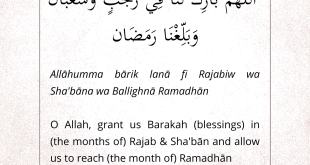 1. Spend time in the company of the pious servants of Allah Ta’ala in order to derive maximum benefit from this month.
1. Spend time in the company of the pious servants of Allah Ta’ala in order to derive maximum benefit from this month.
2. There is a lot of barakah (blessings) in waking up for sehri. Hence, one should fulfil the sunnah of sehri before commencing the fast.
عن أبي سعيد الخدري رضي الله عنه قال قال رسول الله صلى الله عليه و سلم السحور كله بركة فلا تدعوه ولو أن يجرع أحدكم جرعة من ماء فإن الله عز و جل وملائكته يصلون على المتسحرين رواه أحمد وإسناده قوي (الترغيب و الترهيب رقم 1623)
Hazrat Abu Saeed Khudri (radhiyallahu anhu) reports that Rasulullah (sallallahu alaihi wasallam) said: “Sehri is full of blessings. Hence, do not omit the sunnah of sehri, even if one is able to have a sip of water at the time of sehri (one should do so in order to fulfil the sunnah of sehri). Certainly Allah Ta’ala descends His special grace upon those who wake up for sehri and the malaaikah make special duaa for them.”
وعن عمرو بن العاص رضي الله عنه قال قال رسول الله صلى الله عليه وسلم فصل ما بين صيامنا وصيام أهل الكتاب أكلة السحر. (مسلم رقم 1096)
Hazrat Amr bin Aas (radhiyallahu anhu) reports that Rasulullah (sallallahu alaihi wasallam) said: “The difference between our fasts and the fasts of the Ahle kitaab is the eating of sehri.”
3. It is preferable to have sehri during the last portion of the night (i.e. a little before subh-saadiq).
عن أنس بن مالك رضي الله عنه أن نبي الله صلى الله عليه وسلم وزيد بن ثابت تسحرا فلما فرغا من سحورهما قام نبي الله صلى الله عليه وسلم إلى الصلاة فصلى قلنا لأنس كم كان بين فراغهما من سحورهما ودخولهما في الصلاة قال قدر ما يقرأ الرجل خمسين آية (بخاري رقم 576)
Hazrat Anas (radhiyallahu anhu) reports that on one occasion, Rasulullah (Sallallahu Alaihi Wasallam) and Hazrat Zaid bin Thaabit (radhiyallahu anhu) sat to partake of sehri. When they completed with the sehri, Nabi (sallallahu alaihi wasallam) stood up to perform the Fajr salaah. The companions of Anas (radhiyallahu anhu) asked him, “What was the duration of time after they completed sehri till the time the Fajr salaah was performed?” Hazrat Anas (radhiallahu anhu) replied: “The duration was the time it would take a person to recite fifty verses of the Qur’an.”
4. One should have iftaar immediately after sunset.
عن سهل رضي الله عنه قال : قال رسول الله صلى الله عليه وسلم : لا يزال الناس بخير ما عجلوا الفطر. قال أبو عيسى حديث سهل بن سعد حديث حسن صحيح (ترمذي رقم 699)
Hazrat Sahl (radhiyallahu anhu) reports that Rasulullah (sallallahu alaihi wasallam) said: “People will continue to remain upon goodness as long as they hasten in opening their fast.”
عن أبي هريرة رضي الله عنه قال : قال رسول الله صلى الله عليه وسلم قال الله تعالى أحب عبادي إلي أعجلهم فطرا. (ترمذي رقم 700)
Hazrat Abu Hurayrah (radhiyallahu anhu) reports that Rasulullah (sallallahu alaihi wasallam) said that Allah Ta’ala says: “Those servants who are most beloved in My sight are those who hasten to open their fasts at the time of iftaar.”
5. It is best to open one’s fast with dates and water.
عن سلمان بن عامر قال : قال رسول الله صلى الله عليه وسلم إذا أفطر أحدكم فليفطر على تمر فإنه بركة فإن لم يجد تمرا فالماء فإنه طهور (ترمذي رقم 658)
Hazrat Salmaan bin Aamir (radhiyallahu anhu) reports that Rasulullah (sallallahu alaihi wasallam) said: “At the time of iftaar one should open his fast with dates as this is full of blessings, and if this is not possible then he should drink water as this is a means of purification.”
عن أنس قال : كان النبي صلى الله عليه وسلم يفطر قبل أن يصلي على رطبات فإن لم تكن فتميرات فإن لم تكن تميرات حسى حسوات من ماء . (ترمذي رقم 696)
Hazrat Anas (radhiyallahu anhu) reports that Rasulullah (sallallahu alaihi wasallam) would open his fast with fresh dates before performing the Maghrib salaah. If fresh dates were not found, then Rasulullah (sallallahu alaihi wasallam) would open his fast with dry dates. If dry dates were not found, Rasulullah (sallallahu alaihi wasallam) would open his fast with a few sips of water.
6. At the time of iftaar recite the following duaa:
اَللّهُمَّ لَكَ صُمْتُ وَ عَلى رِزْقِكَ أَفْطَرْتُ فَتَقَبَّلْ مِنِّيْ إِنَّكَ أَنْتَ السَّمِيعُ العَلِيم
O Allah, I have kept this fast solely for You, and with Your sustenance I have opened my fast. Accept this fast from me. Indeed You are All hearing and All knowing.
ذَهَبَ الظَّمَأُ وَابْتَلَّتِ الْعُرُوقُ وَثَبَتَ الأَجْرُ إِنْ شَاءَ اللَّهُ
(My) thirst has been quenched, and the veins have been moistened and the reward has been obtained (by Allah Ta’ala) Insha Allah.
عن معاذ بن زهرة قال : إن النبي صلى الله عليه وسلم كان إذا أفطر قال : اللهم لك صمت وعلى رزقك أفطرت. ( أبو داود رقم 2360)
Hazrat Muaaz bin Zuhrah (radhiyallahu anhu) reports that Rasulullah (sallallahu alaihi wasallam) would recite the following duaa at the time of opening the fast:
اَللّهُمَّ لَكَ صُمْتُ وَ عَلى رِزْقِكَ أَفْطَرْتُ
عن ابن عباس رضي الله عنهما قال كان النبي صلى الله عليه و سلم إذا أفطر قال : لك صمت وعلى رزقك أفطرت فتقبل مني إنك أنت السميع العليم رواه الطبراني في الكبير وفيه عبد الملك بن هارون وهو ضعيف (مجمع الزوائد رقم 4893)
Hazrat ibn Abbaas (radhiallahu anhuma) reports that Rasulullah (sallallahu alaihi wasallam) would recite the following duaa at the time of opening the fast:
اَللّهُمَّ لَكَ صُمْتُ وَ عَلى رِزْقِكَ أَفْطَرْتُ فَتَقَبَّلْ مِنِّيْ إِنَّكَ أَنْتَ السَّمِيعُ العَلِيم
عن ابن عمر رضي الله عنهما قال : كان النبي صلى الله عليه وسلم إذا أفطر قال : ذهب الظمأ وابتلت العروق وثبت الأجر إن شاء الله ( أبو داود رقم 2359)
Hazrat ibn Umar (radhiyallahu anhu) reports that Rasulullah (sallallahu alaihi wasallam) would recite the following duaa at the time of opening the fast:
ذَهَبَ الظَّمَأُ وَابْتَلَّتِ الْعُرُوقُ وَثَبَتَ الأَجْرُ إِنْ شَاءَ اللَّهُ
7. Be generous in the month of Ramadhaan. Nabi (sallallahu alaihi wasallam) would express the most amount of generosity in the month of Ramadhaan compared to the other months of the year.
عن ابن عباس قال كان رسول الله صلى الله عليه وسلم أجود الناس وكان أجود ما يكون في رمضان حين يلقاه جبريل وكان يلقاه في كل ليلة من رمضان فيدارسه القرآن فلرسول الله صلى الله عليه وسلم أجود بالخير من الريح المرسلة (بخاري رقم 6)
Hazrat ibn Abbaas (radhiyallahu anhuma) reports that Rasulullah (sallallahu alaihi wasallam) was the most generous of people. He would reach the peak of his generosity in the month of Ramadhaan when Hazrat Jibra’eel (alaihis salaam) would come to meet him (to make dhor and revise the Qur’an). Hazrat Jibra’eel (alaihis salaam) would meet him every night in Ramadhaan wherein they both used to recite the Qur’an Majeed to each other. Rasulullah (sallallahu alaihi wasallam) was more generous than the (beneficial) wind that blew (i.e. the wind is known for having no boundaries and it reaches all places, hence the generosity of Rasulullah (sallallahu alaihi wasallam) even surpassed the limits of the wind in showing love and compassion for the creation).
 Wifāq ul Ulāma (SA) ASSOCIATION OF SOUTH AFRICAN 'ULAMA
Wifāq ul Ulāma (SA) ASSOCIATION OF SOUTH AFRICAN 'ULAMA
